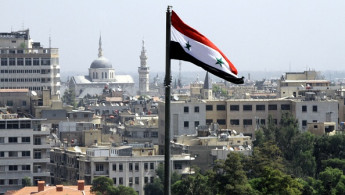Mezzeh Massacre: Damascus strike highlights Israel's growing ruthlessness in Syria
An upmarket Damascus neighbourhood was rocked by a rare explosion late Tuesday night, with an apartment block left largely in ruins and children among the dead following an unprecedented Israeli attack on the Syrian capital.
At least eight civilians, including three women and four children, were killed after three rockets fired from the Israeli-occupied Golan Heights slammed into a residential and commercial complex in Mezzeh - a district largely spared the violence of the civil war - reducing three floors of the building to rubble.
Among the dead were a Yemeni university professor, Dr. Shawki Al-Oud, his Syrian wife and three children, a female physician, Dr. Rafah Qamhiyah, and a mother and child, named as Rana Abdul Razzaq Touma and Qusay Khushman.
The deaths of so many children in the massacre led to revulsion across the country and a rare show of unity across Syria's political divide.
"On behalf of the Syrian Network for Human Rights, I can express our deep condemnation of this attack because it did not distinguish between fighters and civilians," Fadel Abdul Ghany, chairman and founder of the Syrian Network for Human Rights (SNHR), told The New Arab, a monitor that documents civilian and military deaths in Syria's 13-year war.
Iranian presence
The SNHR, the UK-based Syrian Observatory for Human Rights, and Syrian journalists believe Hezbollah and Iranian Revolutionary Guard Corps officers were present in the Mezzeh building when it was hit, part of a large contingent of Iranian-linked officers in Damascus supporting and advising the Assad regime.
"Our condemnation extends to the Syria regime and Iranian Hezbollah.. because both endanger civilians by putting fighters among them, giving Israel an excuse to target this neighbourhood," Abdul Ghany added.
"Although both Israel and Iran are responsible, this does not excuse the targeting of civilians even if military personnel were present."
There has been no official confirmation of the military deaths, but Tehran's influence in Damascus has become evermore apparent if videos of Iranian-sponsored religious and cultural events close to Shia Muslim shrines are to be believed.
"Amongst the Syrian population, Iran is not very popular because the military support for the regime came with efforts to proselytize and impose Iranian norms in terms of clothing, behaviour and public manifestations of religious practices," Bente Scheller, head of the Middle East Division at the Heinrich Boell Foundation told The New Arab.
"Being more and more aware of the threat that brings over Syria coming from Israel, questions will be asked regarding whether Assad sold the country out to foreign powers."
Pro-Tehran militias in more remote eastern Syria have been targeted in hundreds of Israeli attacks over the past decade, but there are indications that more and more civilians are falling victim to Israel's increasingly ruthless campaign against Iranian elements in the Levant.
Yemeni doctor Shawqi Hussein Al-Awdi and his family, including his wife and three daughters, were reportedly killed in an Israeli strike tonight on the Mezzeh district of Damascus. pic.twitter.com/gBfDGWPsY8
— Ali Al-Sakani | علي السكني (@Alsakaniali) October 9, 2024
Tears and humiliation
Damascenes are now witnessing almost weekly Israeli strikes on their city, including the bombing of an Iranian consulate on 1 April which killed 16 people including eight IRGC officers and two civilians.
Last week, a prominent Syrian anchor for a pro-regime channel, Safaa Ahmad, was killed in a suspected Israeli airstrike in Damascus, while rumours circulated about the possible assassination of Bashar Al-Assad's own brother, Maher.
If Israel's intention with Tuesday night's Mezzeh massacre was to shock, then the images of rescue workers picking through rubble in one of Damascus's most glamorous and security-conscious neighbourhoods would have achieved just this.
It also underlined another humiliating admission for Bashar Al-Assad; despite the billions spent on the military to push back Syrian rebels, his air defences are still helpless to prevent Israeli missiles, fired 60km away on occupied Syrian land, from reaching Damascus.
"Yesterday's attack in Damascus was another demonstration that Israel can hit wherever it wants - particularly in Syria... the breaches of the sovereignty of Syria are obvious for everyone," Scheller added.
"Some, even among his cronies, might take this as a sign of weakness and a result of him directing all military efforts against Syria's population, leaving the country vulnerable to foreign interventions."




 Follow the Middle East's top stories in English at The New Arab on Google News
Follow the Middle East's top stories in English at The New Arab on Google News
![A group of Palestinians, foreign and Israeli activists gather to participated in an olive picking event on the land in the town of Battir, which is under threat of confiscation by Israel in Bethlehem, occupied West Bank on 8 November 2024. [Getty]](/sites/default/files/styles/image_330x185/public/2182930803.jpeg?h=199d8c1f&itok=__0LgGsa)

![People gathered around the rubble of destroyed houses to search for survivors [Getty]](/sites/default/files/styles/image_330x185/public/2024-11/GettyImages-2184733820.jpg?h=199d8c1f&itok=NiM1LO2f)